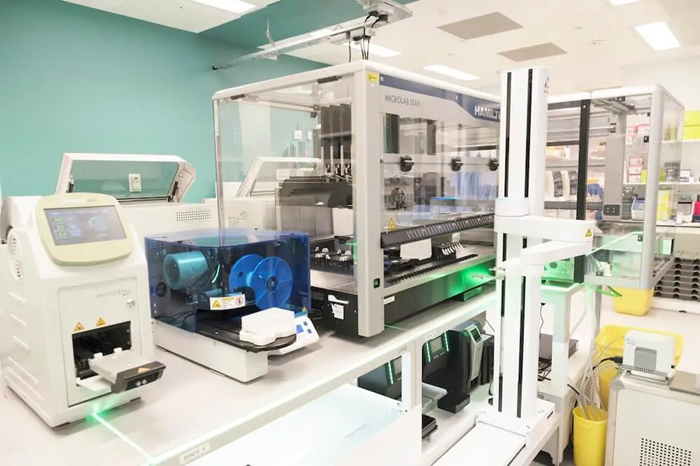For the first time in the UK, robotic technology is being used to support genomic testing for cancer patients following a partnership between The Royal Marsden NHS Foundation Trust and Automata Technologies, a leading automation company powering automation in life sciences labs.

Image Credit: Automata
The innovative installation will double the Trust’s genomics testing capacity and expand the range of tests it can perform within its existing laboratory space. Patients from the hospital and beyond will benefit from increased access to genomic testing, which can help identify potential risk of cancer, diagnose the disease, and personalise treatments. By automating repetitive and time-consuming tasks, it will also give laboratory technologists and scientists more time for vital development work.
Through Automata’s LINQ platform, sample pathways for saliva, tissue biopsies, blood and bone marrow are being automated. LINQ is a ‘smart’ laboratory bench that houses and connects equipment using robotic and digital technology. Equipped with six robotic arms, the specialist cancer center’s installation will substantially increase the throughput of the cancer testing lab without compromising on accuracy.
As the cancer testing laboratory for the North Thames Genomics Laboratory Hub – one of seven hubs in England – The Royal Marsden currently provides somatic testing for North London, Hertfordshire and Mid and South Essex. This form of genomic testing identifies genetic changes in cancer cells that drive tumour growth and provides a target for personalised cancer treatment.
With increased capacity thanks to automation, the hospital will not only be able to process more somatic tests but also launch new genetic – or cancer germline – testing. This type of genomic testing identifies inherited genetic changes that can increase risk of cancer and, for patients with the disease, can also be used to identify the right treatments. It will primarily test for mutations in the BRCA genes, which can impact risk of various cancers including breast and ovarian.
The new testing capability will support research into genetics and cancer, such as the BRCA-DIRECT mainstreaming pilot. Led by Dr Clare Turnbull, Professor of Translational Cancer Genetics at The Institute of Cancer Research, London, and Consultant in Clinical Cancer Genetics at The Royal Marsden NHS Foundation Trust, with funding from the NHS Cancer Programme Small Business Research Initiative (SBRI) the project is aiming to boost BRCA gene testing access for breast cancer patients and their family members through a simple, digital pathway.
The new robotic facility is housed in the Sharjah Clinical Genomics Laboratory in the National Institute for Health and Care Research (NIHR) Centre for Molecular Pathology (CMP) at The Royal Marsden. The NIHR CMP is supported by funding from the National Institute for Health Research Biomedical Research Centre at The Royal Marsden and The Institute of Cancer Research, London, and The Royal Marsden Cancer Charity.
"Over 90 % of our genomics samples will pass through the new automated laboratory, which blends new and existing equipment to make the best use of space. Our highly qualified laboratory staff are delighted with the facility which has freed them up from repetitive and time-consuming tasks to focus on quality and service development.
The robots are flexible, efficient and fun to work with too. Excitingly, this system also has the potential to one day reduce costs and turnaround times which will benefit patients and the wider NHS. We are incredibly excited to be the first laboratory in the country to use this technology for genomic cancer testing and look forward to further developments in the future.”
Professor Michael Hubank, Scientific Director of Clinical Genomics at The Royal Marsden NHS Foundation Trust and Professor of Translational Genomics at The Institute of Cancer Research, London
We are proud that our partnership with The Royal Marsden has delivered the UK’s first fully automated system for clinical cancer genomic testing. This collaboration marks just the beginning of what automation can achieve for the NHS and within healthcare more widely.
By using end-to-end lab automation to increase genomic testing capacity, we’re not only streamlining processes but also elevating national cancer care. Together, we’re pioneering solutions that will redefine the standard of care and positively impact patient outcomes.”
Mostafa ElSayed, CEO, Automata
About The Royal Marsden NHS Foundation Trust
The Royal Marsden opened its doors in 1851 as the world’s first hospital dedicated to cancer diagnosis, treatment, research and education.
Today, together with its academic partner, The Institute of Cancer Research (ICR), it is the largest and most comprehensive cancer center in Europe seeing and treating over 59,000 NHS and private patients every year. It is a center of excellence with an international reputation for groundbreaking research and pioneering the very latest in cancer treatments and technologies.
The Royal Marsden, with the ICR, is the only National Institute for Health and Care Research Biomedical Research Centre for Cancer. This supports pioneering research work carried out over a number of different cancer themes.
The Royal Marsden Cancer Charity raises money solely to support The Royal Marsden, a world-leading cancer center. It ensures Royal Marsden nurses, doctors and research teams can provide the very best care and develop life-saving treatments, which are used across the UK and around the world.
From funding state-of-the-art equipment and ground-breaking research, to creating the very best patient environments, The Royal Marsden Cancer Charity will never stop looking for ways to improve the lives of people affected by cancer.